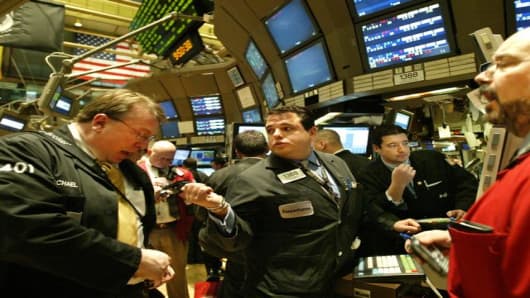With the Federal Reserve likely to keep interest rates on hold the rest of this year, many investment pros expect the dollar to remain weak, oil prices to keep rising—and stocks to head even lower.
"It's not going to be a fun summer," says David Rovelli, head of US equity trading for Boston-based Canaccord Adams. "There's low volume, the Fed's not going to do anything because of the election, there's no catalyst and we're just drifting in nowhere land."
The central bank announced Wednesday it was holding its key short-term rate at 2% and gave no hint that it might boost rates soon to ward off growing inflation.
As a result, the dollar is likely to remain lower against foreign currencies, which whets investor appetite for dollar-denominated commodities, specifically oil. Stocks, in turn, aren't expected to rally—even from their current low levels—until the Fed signals a change in interest-rate policy.
So with a moribund market ahead, some investors are changing their strategy: instead of trying to find individual stocks or sectors that might rise in a down market, they're taking advantage of the broader market's trend downwards.
That means shorting the market, or betting on stocks continuing to decline.
"The reality is things go up and things go down, and if we're going to be efficient in making money in the market consistently, we have to take advantage of both," says Ron Ianieri, head of Options University. "There is a time to be short and being short something that is dropping is just as profitable as being long something that is up."
For traditional stock trading, a short sale involves borrowing shares, selling them to a third party, then buying them back at a later date with the hope that they'll be cheaper. Though the rewards can be great, the risk is high.
ETF Plays Less Risky
But short playing has become much easier and less risky with the onslaught of ETFs, or exchange-traded funds, that have flooded the market over the past 10 years. ETFs work much the same way as mutual funds but offer greater trading flexibility and lower costs.
Kathy Boyle, president of Chapin Hill Advisors, has been using ETFs heavily to short the market recently and has realized 20 percent gains over the past few weeks. ProShares is a leader in not only long-play sector-based ETFs but also ones that short the market and offer double the return on downward index movements.
They include the ProShares Ultrashort QQQ, which rewards a fall in the Nasdaq; Proshares Ultrashort S&P 500, which rewards a fall in the S&P benchmark, and the Proshares Ultrashort Dow 30, which tracks the bluechip industrials.
Rydex recently rolled out eight new ETFs, half of which offer double-inverse plays on the energy, financial, health care and technology sectors. The Rydex Inverse 2x Select Sector Financial was up more than 8 percent in light Thursday trading.
Boyle is a strong believer that the market will continue to move lower until the housing slide plays out and other economic weights are lifted.
"This is going to one ugly decline," she says. "If we get a new administration and it comes out with a strong program or we get things so cheap and so beaten up that it just bottoms, then we could see some light at the end of the tunnel."
Both Boyle and Rovelli, despite overall bearish outlooks, allow some room for a bounce, which is why most investment pros advocate short plays as a hedge and a way to diversify a portfolio in times of uncertainty.
"There's no good news. When there's no good news sometimes when you get that violent rally, that bear-market rally," Rovelli says.
Playing the Falling Dollar and Rising Oil
In addition to the general trend of the market falling, investors will be looking for ways to capitalize on the weaker dollar and surge in energy prices.
Jack Crooks, an analyst and trader with Weiss Research, recommends short market plays and also believes that the weak dollar will have global repercussions. He's short near-term against the Swiss and Canadian currencies and short long-term against the pound.
In equities, Crooks says dollar issues also will infect the global economy. He likes commodities, many of which also can be played through ETFs.
The Vanguard Energy ETF is a popular play during the oil surge and has gained more than 10 percent this year. Energy ETFs, of which there were only five as recently as four years ago, have grown widely in popularity.
"With this kind of lingering credit crisis, a weaker dollar is really just spreading more risks and that risk spreads into higher commodity prices and lower stocks," he says. "That adds to our rationale that sooner or later the Fed has to step in and do something very firm and put a low on the dollar, because it isn't helping anybody at the moment except people who are short the dollar and long crude."
Ianieri has been short financials during the credit crunch and home builders as real estate problems continue.
"If you have that opinion and you've got good fundamental reasons and tech support behind it, then play the downside," Ianieri says. "There's nothing wrong with that."



